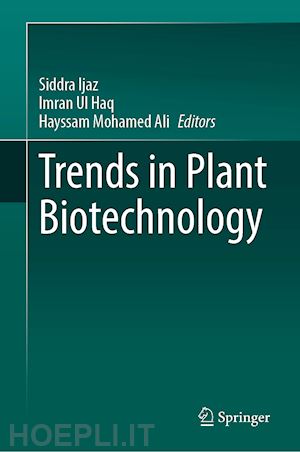
Questo prodotto usufruisce delle SPEDIZIONI GRATIS
selezionando l'opzione Corriere Veloce in fase di ordine.
Pagabile anche con Carta della cultura giovani e del merito, 18App Bonus Cultura e Carta del Docente
This book explains the advancements of plant biotechnology and advanced molecular biology and explores the details of influential tools that complement conventional breeding and accelerate the development of plants resilient to adverse agroclimatic conditions and biofortified plants. Plant biotechnology from the basic sciences to current applications, such as pathway engineering, precursor feeding, transformation, elicitation with biotic and abiotic elicitors, and scaling up in bioreactors, have been included in these chapters to improve the production of secondary metabolites from different medicinal plants. It also highlights important factors often overlooked by methodologies used to develop plants' tolerance against biotic and abiotic stresses and in developing special foods, bio-chemicals, and pharmaceuticals. This book is valuable for researchers or students working on biosciences. It is also an updated and advanced reference material for the agriculture and pharmaceutical industries.
1. Tissue Culture and Somatic Fusion in Plants.- 2. Genetic Transformation in Plants: Methods and Applications.- 3. Genomics.- 4. Transcriptomics.- 5. Plant Proteomic approaches, expression of simple peptides to complex proteins.- 6. Plant metabolomics.- 7. Genome Editing.- 8. Application of CRISPR/Cas Technology in Drug Development.- 9. Plant System Biology.- 10. Bioinformatics and Computational Biology.- 11. Chemoinformatics.
Dr. Siddra Ijaz
Centre of Agricultural Biochemistry and Biotechnology, University of Agriculture Faisalabad, Faisalabad 38040, Pakistan
Dr. Siddra Ijaz, with a vibrant career in agriculture and biotechnology, has a Ph.D. from the University of Agriculture Faisalabad, Pakistan, and a Post-Doc from the Plant Reproductive Biology Laboratory, University of California Davis, USA. She is an Associate Professor at the Center of Agricultural Biochemistry and Biotechnology (CABB), University of Agriculture, Faisalabad, Pakistan. She is also serving as Deputy Managing Editor of an international Impact factored Journal, Pakistan Journal of Agricultural Sciences. She has supervised more than 60 M.Phil and Ph.D. students. She was a National Curriculum Revision Committee member from 2013 to 2014. She has published over 50 articles, 09 books, 01 laboratory manual, and several book chapters. She is the Incharge of "Molecular Biology of Plant Disease Resistance Laboratory", CABB, UAF. She is the curator of the Fungal Molecular Biology Laboratory Culture Collection (FMB-CC-UAF) and an a?liated member of the World Federation for Culture Collections (WFCC). Her research focuses on plant biotechnology, including genomics, genome probing for identifying disease resistance genes, genome engineering for fungal disease resistance in plants, and disease management through nanobiotechnology.
Dr. Imran Ul Haq
Department of Plant Pathology, University of Agriculture, University Road, Faisalabad 38040, Pakistan
Dr. Imran Ul Haq, with a bright career in agriculture, plant pathology, and fungal molecular biology, has Post-Doc from University of California Davis, USA. He is an Associate Professor in the Department of Plant Pathology, University of Agriculture Faisalabad, Pakistan. He has supervised more than 40 graduate students and established Fungal Molecular Biology Laboratory Culture Collection (FMB-CC-UAF), an affiliated member of the World Federation for Culture Collections (WFCC). He has published more than 60 articles, 08 books, 04 laboratory manuals and several book chapters. He has made colossal contributions in fungal taxonomy by reporting novel species of a fungal pathogen in plants. His research interests are fungal molecular taxonomy and nanotechnology integration with other control strategies for sustainable plant disease management.
Dr. Hayssam Mohamed AliDepartment of Botany and Microbiology, College of Science, King Saud University, Riyadh, Saudi Arabia











Il sito utilizza cookie ed altri strumenti di tracciamento che raccolgono informazioni dal dispositivo dell’utente. Oltre ai cookie tecnici ed analitici aggregati, strettamente necessari per il funzionamento di questo sito web, previo consenso dell’utente possono essere installati cookie di profilazione e marketing e cookie dei social media. Cliccando su “Accetto tutti i cookie” saranno attivate tutte le categorie di cookie. Per accettare solo deterninate categorie di cookie, cliccare invece su “Impostazioni cookie”. Chiudendo il banner o continuando a navigare saranno installati solo cookie tecnici. Per maggiori dettagli, consultare la Cookie Policy.